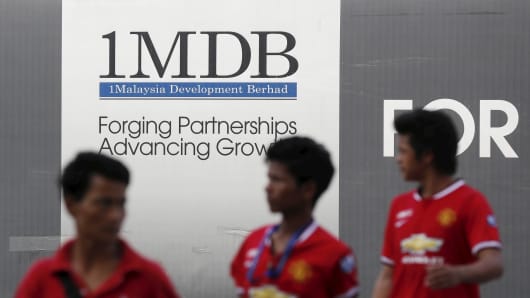Singapore’s central bank has fined Credit Suisse and United Overseas Bank (UOB) for breaches relating to the scandal-hit Malaysian sovereign wealth fund 1Malaysia Development Berhad (1MDB), it said in a statement on Tuesday
The Monetary Authority of Singapore (MAS) said it has imposed a 700,000 Singapore dollars ($505,000) fine on Credit Suisse and a 900,000 Singapore dollars ($649,000) penalty on UOB. The two banks were found to have breached several anti-money laundering requirements.
“These include weaknesses in conducting due diligence on customers and inadequate scrutiny of customers’ transactions and activities. MAS did not however detect pervasive control weaknesses within these banks,” the central bank said.
Following MAS’ latest announcement, Credit Suisse and UOB said in statements to the media that they acknowledged the findings by the central bank. Both banks said they have worked to strengthen their anti-money laundering controls.
“Notwithstanding that the Monetary Authority of Singapore (MAS) review findings show there are no pervasive anti-money laundering control weaknesses, we acknowledge the outcome of the review and regret that we have fallen short of the MAS’ and our own high standards,” a Credit Suisse spokesperson said.
UOB said it will also enhance its training program to raise risk and control awareness among the bank’s staff.
In addition to financial penalties imposed on the banks, the MAS also issued lifetime Prohibition Orders against a former Singapore branch manager of Falcon Private Bank, Jens Fred Sturzenegger, and two ex-employees of BSI Bank, Yak Yew Chee and Seah Mei Ying.
The Prohibition Orders, effective from May 29, 2017, prevent them from providing any capital markets or financial advisory services and managing any capital markets services or financial advisory firm in Singapore.
The central bank also said it intends to issue Prohibition Orders ranging from three to six years against three others for their involvement in 1MDB-related activities.
MAS completes two-year anti-money laundering review
MAS said it has completed the two-year long review of financial institutions involved in 1MDB-related fund flows — the most extensive investigation the central bank has ever taken.
“The review uncovered a complex web of transactions involving numerous shell companies and individuals operating in multiple jurisdictions, including the United States, Switzerland, Hong Kong, Luxembourg and Malaysia,” it said.
Questions about movement of funds from 1MDB came to widespread attention when the Wall Street Journal reported that in 2013 nearly $700 million had flowed from the debt-ridden fund to Malaysian Prime Minister Najib Razak’s personal bank account.
Najib has repeatedly denied wrongdoing and, under pressure from the outcry caused by the report, said the funds were a private donation from a Middle Eastern country he declined to name. He has denied benefiting personally from the funds.
Malaysian Attorney General Mohamed Apandi Ali later said that Saudi Arabia’s royal family gave Najib a $681 million gift, of which about $600 million was later returned. Apandi said that no criminal offense had been committed.
Singapore’s investigations into 1MDB-related breaches started in March 2015. Since then, the MAS shut down two Swiss-based private banks, BSI and Falcon, and imposed financial penalties of 29.1 million Singapore dollars ($21 million) on eight banks including UBS and Standard Chartered.
The central bank also hauled several individuals to court and barred them from participating in the Singapore finance industry. The prohibition included a former director of Goldman Sachs Singapore, Tim Leissner, who issued an unauthorized letter to a financial institution based in Luxembourg to clear Malaysian tycoon Low Taek Jho of money laundering concerns.
MAS’ managing director Ravi Menon said the two-year long review holds key lessons for Singapore.
“MAS has enhanced its AML (anti-money laundering) surveillance and taken unprecedented enforcement actions against errant institutions and individuals. Financial institutions have increased their risk awareness and strengthened their AML controls,” he said.
“Our financial industry is in a better position today than it was when the abuses stemming from the 1MDB-related flows took place. The price for keeping our financial center clean as it grows in size and inter-connectedness is unstinting vigilance.”
